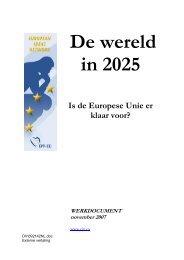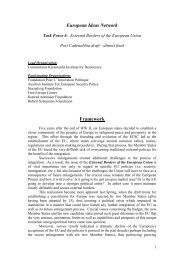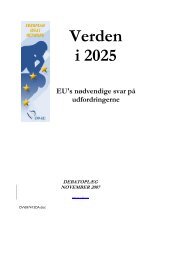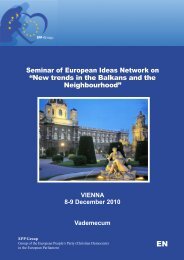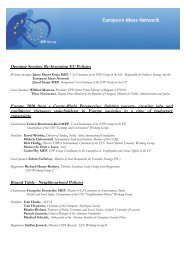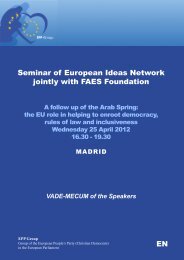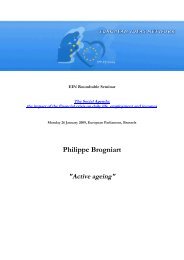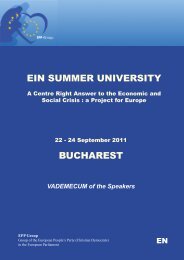Speech of Wilfried Martens, President, European Peoples Party
Speech of Wilfried Martens, President, European Peoples Party
Speech of Wilfried Martens, President, European Peoples Party
Create successful ePaper yourself
Turn your PDF publications into a flip-book with our unique Google optimized e-Paper software.
EIN Summer University<br />
Thursday, 18 September 2008, Fiuggi, Italy<br />
The World in 2025:<br />
The Place for Values in an Uncertain World<br />
<strong>Wilfried</strong> <strong>Martens</strong><br />
<strong>President</strong>, <strong>European</strong> <strong>Peoples</strong> <strong>Party</strong>
Disclaimer<br />
The <strong>European</strong> Ideas Network is a forum for debate, created by the EPP-ED Group in the<br />
<strong>European</strong> Parliament, to analyse the economic, political and social challenges facing Europe and<br />
to develop practical policy options to meet them.<br />
This paper, like all publications <strong>of</strong> the <strong>European</strong> Ideas Network, does not represent the<br />
collective views <strong>of</strong> the EIN or <strong>of</strong> the EPP-ED Group but only the view <strong>of</strong> its author.<br />
Copyright <strong>of</strong> this publication is held by the author. You may not copy, reproduce, republish or<br />
circulate in any way the content from this publication except for your own personal and noncommercial<br />
use. Any other use requires the prior written permission <strong>of</strong> the author.<br />
2
<strong>Wilfried</strong> <strong>Martens</strong><br />
<strong>President</strong>, <strong>European</strong> <strong>Peoples</strong> <strong>Party</strong><br />
“The World in 2025: The Place for Values in an Uncertain World”<br />
As president <strong>of</strong> the <strong>European</strong> People’s <strong>Party</strong>, I have had the pleasure to participate at these<br />
Summer Universities and I am always impressed by the fruitfulness <strong>of</strong> debates and the freshness<br />
<strong>of</strong> discussions concerning the issues <strong>of</strong> tomorrow.<br />
Political foundations have played an active role in the quest to achieve <strong>European</strong> integration.<br />
Until now their involvement was strictly on a national level. For the last 25 years the idea <strong>of</strong><br />
<strong>European</strong> political foundations was something I believed to be lacking in the <strong>European</strong> political<br />
scene.<br />
As you can imagine, I was delighted when the project <strong>of</strong> <strong>European</strong> political foundations was<br />
tabled in March <strong>of</strong> 2006 and we could create the Centre for <strong>European</strong> Studies <strong>of</strong> the EPP.<br />
Under the direction <strong>of</strong> James Elles, EIN’s contribution to the development <strong>of</strong> innovative<br />
policies was enormous. And now with the EIN's new Chairman, Jaime Mayor Oreja, we have<br />
committed ourselves to work closely with it and to maintain our strong relationship and close<br />
co-operation. The title <strong>of</strong> this year’s Summer University ‘The World in 2025: The Place for<br />
Western values in an Uncertain World’ suggests that we are today living in a world <strong>of</strong> pr<strong>of</strong>ound<br />
uncertainty and that the beliefs and values <strong>of</strong> the Western society could be essential and decisive<br />
for the future.<br />
The EPP has been enrooted on the principles <strong>of</strong> Christian democracy: personalism, social<br />
market economy, a federal and decentralized Europe, subsidiarity and democracy since its<br />
foundation in 1976, in the political tradition <strong>of</strong> our Founding Fathers.<br />
We made these ideals explicit and concrete in our party activities and in the <strong>European</strong> integration<br />
process. What fundamentally unites us, in spite <strong>of</strong> our specific origins and different political<br />
cultures and our Catholic, Protestant, Orthodox, Jewish, Anglican and Muslim traditions, we<br />
mutually established these principles in our basic programme at our historic congress in Athens<br />
in November 1992.<br />
Christian democracy should not be taken for granted. It is constructed on a carefully crafted set<br />
<strong>of</strong> values that are rooted in the essence <strong>of</strong> every human being. It affirms the dignity <strong>of</strong> the<br />
human being and regards man as the subject and not the object <strong>of</strong> history. On the basis <strong>of</strong><br />
Judaeo-Christian values, each person is unique, irreplaceable, totally irreducible, free by nature<br />
and open to transcendence.<br />
Because they are free, responsible and interdependent, people must take part in the construction<br />
<strong>of</strong> society. For many, what lies behind this commitment is the belief that we are called on to<br />
contribute to God's work <strong>of</strong> creation and freedom.<br />
Thus our thought and political action are based on fundamental, interdependent, and equally<br />
important universal values: freedom and responsibility, fundamental equality, justice and<br />
solidarity.<br />
3
Genuine freedom means autonomy and responsibility, not irresponsible independence.<br />
All human beings are equal because they are endowed with the same dignity. Notwithstanding<br />
their differences in terms <strong>of</strong> talents and abilities, each person must be capable <strong>of</strong> achieving<br />
personal development regardless <strong>of</strong> origin, sex, age, race, nationality, religion, conviction, social<br />
status or state <strong>of</strong> health.<br />
Justice means that the conditions for individuals to exercise their freedom must be guaranteed at<br />
all times.<br />
But justice cannot be arbitrary or be perceived as the tyranny <strong>of</strong> the majority. It respects the<br />
minority and no majority can deny the free exercise <strong>of</strong> its rights.<br />
Justice, fundamental equality for all and the dignity <strong>of</strong> every individual are inseparable. Solidarity<br />
means an awareness <strong>of</strong> the interdependence and interrelatedness <strong>of</strong> individuals and their<br />
communities. It means above all protecting the weakest in our society and around the world.<br />
Our concept <strong>of</strong> the person rejects selfish individualism and collectivism as a reducing factor. We<br />
reject extremes and exclusion - we advocate dialogue, tolerance and sharing.<br />
Christian democracy opposes the unjust exploitation <strong>of</strong> the earth, without respect for the selfregenerating<br />
potential <strong>of</strong> nature.<br />
Respect for the created world means that responsible management <strong>of</strong> the biosphere mankind's<br />
common heritage is necessary and essential for the harmonious development <strong>of</strong> every living and<br />
future human being.<br />
Subsidiarity means that power must be exercised at the level <strong>of</strong> solidarity, effectiveness and<br />
participation <strong>of</strong> citizens; in other words where it is most effective and closest to the individual.<br />
Subsidiarity is based on the premise that society can be constructed freely. Public authorities<br />
must respect human rights and fundamental freedoms, recognize the autonomy <strong>of</strong> civil society<br />
and not take the place <strong>of</strong> social and private initiative.<br />
Christian democrats consider democracy as vital for the development <strong>of</strong> individuals. The<br />
participation <strong>of</strong> each person in public life and in decision-making is essential for democracy. This<br />
commitment implies strengthening <strong>of</strong> the constitutional state.<br />
Applying subsidiarity, international partnership, participation by all especially through free<br />
elections enables each person to achieve respect for others and progress towards the resolution<br />
<strong>of</strong> conflicts.<br />
The limits imposed by subsidiarity contribute to the separation <strong>of</strong> powers and prevent their<br />
concentration. Every authority is, in effect, at the service <strong>of</strong> the individual. No state can therefore<br />
use the pretext <strong>of</strong> respect for its sovereignty in order to violate the rights and freedoms <strong>of</strong><br />
persons or communities.<br />
The raison d'être <strong>of</strong> the sovereignty <strong>of</strong> states is to enable them to work freely and as best they<br />
can in order to ensure the well-being and development <strong>of</strong> their people and to defend<br />
4
international law. This also means, that states must share their sovereignty in supranational and<br />
international organizations.<br />
Since we welcomed our like-minded political parties, we accepted and created religious pluralism<br />
and understanding within the <strong>Party</strong>. This plurality <strong>of</strong> religious backgrounds does not pose a<br />
threat to the fundamental and all-encompassing values <strong>of</strong> Christian democracy.<br />
On the contrary, it is precisely our concept <strong>of</strong> man that unites us. EPP’s Athens basic document<br />
made religious dialogues between the EPP and various Christian denominations a great success.<br />
The contribution <strong>of</strong> these dialogues to promoting inter-religious and cultural understanding is<br />
enormous. The relevance <strong>of</strong> those dialogues is amplified by the fact that immigration has<br />
changed the demographics <strong>of</strong> Europe.<br />
It is now ten years since the first Dialogue between the EPP and the Orthodox Churches and it<br />
has been an instrument <strong>of</strong> progress, having served as a tool for reconciliation <strong>of</strong> peoples in<br />
south-eastern Europe after the fall <strong>of</strong> communism and by reconciling them with the <strong>European</strong><br />
Union.<br />
Europe is no longer what it was 50 years ago. National states have started operating<br />
harmoniously within multinational, federated political and economic systems. Multiculturalism<br />
and inter-religious tolerance are increasingly present.<br />
In keeping with these changes, the Christian democrat movement has evolved to acclimatise<br />
itself to the social and demographic shifts within Europe. It is currently in a perfect position to<br />
play an essential role in almost all phases <strong>of</strong> the <strong>European</strong> integration process.<br />
The recent institutional crisis after the no-vote in France, the Netherlands and the Irish no-vote<br />
on the Lisbon Treaty was a clear reminder <strong>of</strong> the importance <strong>of</strong> building trust, and restoring<br />
confidence in our common beliefs and vision.<br />
Instrumental in this regard are the convictions that inspire our values and our political action.<br />
Although Christian faith is no longer the only source <strong>of</strong> inspiration, its presence is ever more<br />
essential in giving us the necessary tools to cope with challenges in Europe.<br />
We reaffirm the link between, on the one hand, Christian values based on the Gospel and<br />
Christian cultural heritage and, on the other hand, the democratic ideals <strong>of</strong> freedom,<br />
fundamental equality between men, social justice and solidarity.<br />
If the EPP would reject, forget, neglect or dilute its values, it would merely be an instrument <strong>of</strong><br />
power, without soul or future, while also forfeiting its universal and original message, which is<br />
based on a global apprehension <strong>of</strong> the irreducible complexity <strong>of</strong> the human being and <strong>of</strong> life in<br />
society.<br />
5



